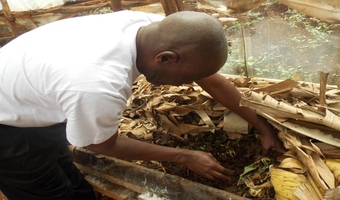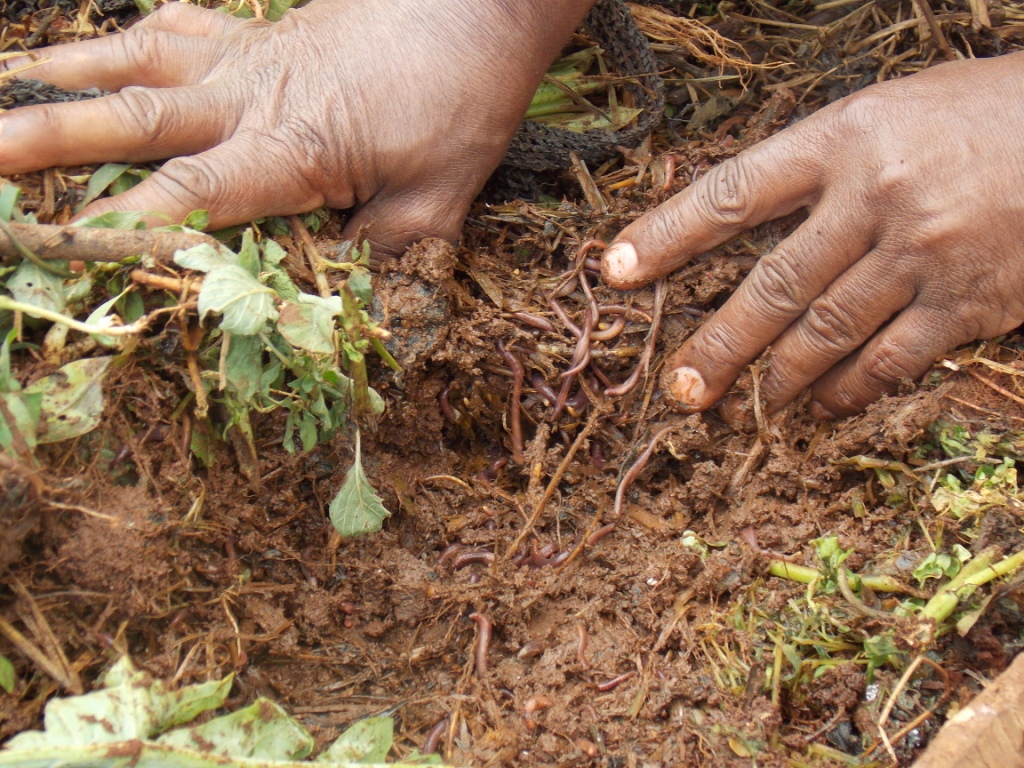 James Wafula, a researcher-cum-farmer from Trans Nzoia County has ventured into earthworms farming with an intension of obtaining organic fertilizers that could be used in organic farming. In this the farmer aims to provide solution to his tired soil caused by much use of synthetic fertilisers over time.
James Wafula, a researcher-cum-farmer from Trans Nzoia County has ventured into earthworms farming with an intension of obtaining organic fertilizers that could be used in organic farming. In this the farmer aims to provide solution to his tired soil caused by much use of synthetic fertilisers over time.
According to the Kenya Institute of Organic Farming (KIOF), the use of chemical fertilizers has been common practice among most farmers in the county and despite their benefits to agricultural productivity, use of synthetic fertilisers and pesticides degrade the environment and contaminate food.
It is for this reason Wafula established a vermiculture unit on his farm a year ago to raise earthworms initially to use as part of his research on climate change and adaptation under the African Climate Leadership Programme (2017-2020).
“Though the original idea was to use this for my research project, somewhere along the way, I developed an interest in uptake full farming as the returns were encouraging,” said the farmer from Cherangany Sub County and a renewable energy expert.
“I developed an interest in this venture because it has the potential of helping farmers use locally available materials to produce fertilizers for use in their farms which will also reduce input costs,” he said.
RELATED ARTICLE: Farmer earns from rearing red worms for organic manure
To start, Wafula bought 10 kilograms of earthworms early last year from a farmer in Nairobi at a cost of Sh2 500 per kilogram.
He then introduced them on a small plot as a trial on his farm. He has constructed bins cut from large liquid containers and put in metal frames to make vermibedding- which is the material that the earthworms are reared.
Once vermibeddings are made with good aeration and moisture holding capacity which can hold moisture for up to 90 per cent, vermiculture becomes very easy.
“Earthworms can feed on any foodstuff material apart from meat, oily substances, fried foodstuff, and citrus fruits,” said the former don of Kenyatta and Nairobi universities.
RELATED ARTICLE: Worms churn garbage to \'gold\' for farmers
However, anything else can be chopped up to make the composting process faster placed in the vermibedding and just a week after placing the chopped farm wastes in the vermibedding, they get consumed by the worms.
The process continues and after four months, the earthworms would have excreted enough worm castings where a farmer can choose to continue feeding them to produce more or harvest and replace with other vermibedding to start the process afresh.
“For any earthworm lovers you will find that you keep on improving because the earthworms keep increasing with time,” he says.

RELATED ARTICLE: Worms\' liquid offers crops more nutrients than fertilisers
To one of his six bins, Wafula placed five kilos of banana stems and leaves both chopped up and used as vermibedding. He also placed two kilos of maize stalks, another two kilos of soil and introduced three kilos of earthworms.
He says after four months, he harvested 8.5 kilograms of earthworms from that bin and obtained 60 kilograms of vermicompost manure.
Wafula tests his vermicompost at the Kenya Agricultural and Livestock Research Organization (KALRO), Trans Nzoia County branch to test the composition of nitrogen, potassium, phosphorus and the PH levels.
Currently, he is trying to use different vermibedding and food for the earthworms to determine whether they could lead to an increase in the percentage of the elements in the vermicompost manure that would be harvested for purposes of improving production.
He says he is scaling his earthworm farming to the next level after noting that they fetch good prices from both the earthworms and the vermicompost manure while targeting to enter into a contract with farmers and producers to supply enough vermicompost and earthworms.
“Through earthworms farming, farmers can minimize the use of chemical fertilizers which have become very harmful to the environment, wildlife and human beings.”
















Comments powered by CComment